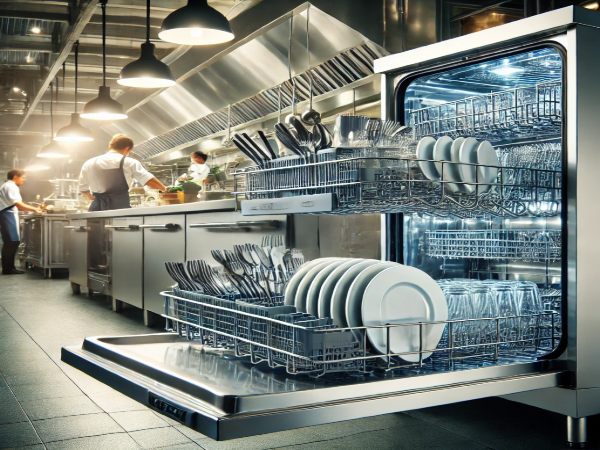Commercial Dishwasher: The Ultimate Solution for Efficient Kitchen Cleaning
Boost Efficiency and Hygiene in Your Commercial Kitchen with the Right Dishwasher Solution

A commercial dishwasher is an essential appliance for restaurants, hotels, and other food service businesses. It ensures quick and efficient cleaning of kitchenware, maintaining hygiene and improving workflow in busy kitchens.
What is a Commercial Dishwasher?
A commercial dishwasher is a high-performance kitchen appliance designed to clean and sanitize large quantities of dishes, utensils, and cookware within minutes. Unlike residential dishwashers, commercial models operate at higher temperatures and use specialized detergents to remove grease, bacteria, and food particles effectively. These machines are indispensable in the food industry, ensuring compliance with health and safety regulations.
Types of Commercial Dishwashers
Understanding the different types of commercial dishwashers can help businesses choose the best model for their needs.
Undercounter Commercial Dishwashers
These compact units are ideal for small cafes, bars, and restaurants. They function like residential dishwashers but offer faster cycle times and higher efficiency.
Door-Type Commercial Dishwashers
Also known as pass-through dishwashers, these models are designed for medium-sized kitchens. They feature a pull-down door and can clean a full rack of dishes in under two minutes.
Conveyor Commercial Dishwashers
Best suited for high-volume food establishments such as hotels and hospitals, these machines use a conveyor belt system to process hundreds of dishes per hour.
Glasswashers
Designed specifically for bars and restaurants, glasswashers clean delicate glassware without damaging it. They provide spot-free and streak-free results.
Benefits of Using a Commercial Dishwasher
Investing in a commercial dishwasher offers multiple advantages, including:
Time Efficiency: Reduces manual dishwashing time, allowing staff to focus on other tasks.
Water Conservation: Uses less water compared to handwashing.
Enhanced Hygiene: High-temperature cycles kill bacteria and ensure sanitary kitchenware.
Cost-Effective: Reduces labor costs and detergent usage in the long run.
Durability: Built for continuous use, withstanding the demands of a busy kitchen.
How to Choose the Right Commercial Dishwasher
Selecting the right commercial dishwasher depends on several factors:
Capacity Requirements
Consider the volume of dishes your business handles daily. Small cafes may require an undercounter model, while large restaurants may need a conveyor dishwasher.
Space Availability
Measure your kitchen space before purchasing. Undercounter and door-type models are ideal for compact areas, while conveyor dishwashers need more room.
Temperature Preference
There are two main types:
High-Temperature Dishwashers: Use hot water (180°F) for sanitation, requiring a booster heater.
Low-Temperature Dishwashers: Use chemical sanitizers instead of hot water, making them energy-efficient.
Energy Efficiency
Look for ENERGY STAR-certified models that consume less water and electricity, reducing operational costs.
Proper Maintenance Tips for a Commercial Dishwasher
To maximize performance and lifespan, follow these maintenance tips:
Regular Cleaning
- Wipe down interior surfaces daily.
- Remove food debris from filters.
Descale the Machine
In hard water areas, scale buildup can reduce efficiency. Use a descaling agent regularly.
3. Inspect Spray Arms
Ensure spray arms are not clogged with debris, as blocked nozzles affect cleaning performance.
Check Seals and Gaskets
Worn-out door seals can cause leaks. Replace damaged seals to prevent water wastage.
Routine Professional Servicing
Annual inspections by a technician help detect potential issues early, preventing costly repairs.
Common Issues and Troubleshooting
Even the best commercial dishwashers may encounter occasional problems. Here’s how to fix them:
Dishes Not Cleaning Properly
- Check for clogged spray arms.
- Ensure detergent levels are adequate.
Cloudy or Streaky Glassware
- Use the correct rinse aid.
- Verify water temperature settings.
Machine Not Draining
- Inspect drain filters for blockages.
- Ensure the drain hose is properly connected.
Conclusion
A commercial dishwasher is a game-changer for any food business, ensuring fast and efficient cleaning while maintaining hygiene standards. Choosing the right model, maintaining it properly, and troubleshooting minor issues can maximize its efficiency and lifespan. Investing in a high-quality commercial dishwasher ultimately enhances workflow, reduces costs, and keeps customers satisfied with spotless kitchenware.



